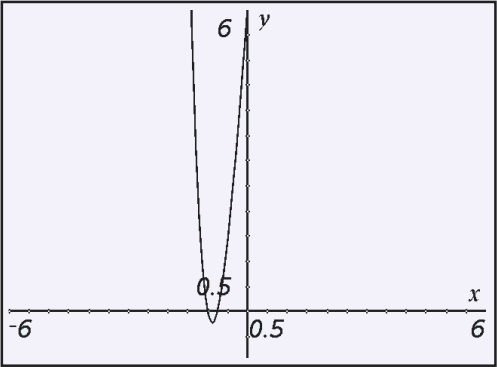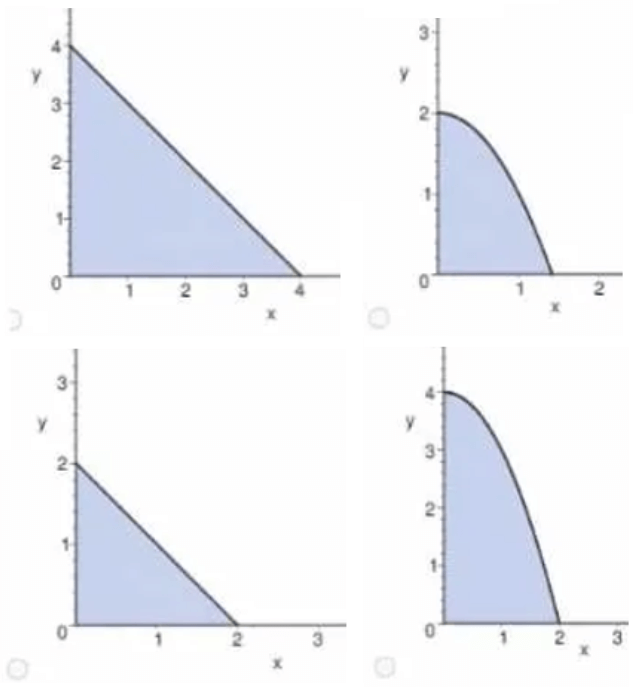METHOD OF UNDETERMINED COEFFICIENTS
We can construct a polynomial with the given information using the method of undetermined coefficients. That is, we shall determine coefficients of the required polynomial using the given conditions. The main idea here is that two polynomials are equal, if and only if the coefficients of same powers of the variables in the two polynomials are equal.
Example 1 :
Find a quadratic polynomial f(x) such that
f(0) = 1
f(-2) = 0
f(1) = 0
Solution :
Let f(x) = ax2 + bx + c be the required quadratic polynomial.
Given : f(0) = 1.
f(0) = 1
a(0)2 + b(0) + c = 1
c = 1
Given : f(-2) = 0.
f(-2) = 0
a(-2)2 + b(-2) + c = 0
4a - 2b + c = 0
Substitute c = 1.
4a - 2b + 1 = 0
4a - 2b = -1 ----(1)
Given : f(1) = 0.
f(1) = 0
a(1)2 + b(1) + c = 0
a + b + c = 0
Substitute c = 1.
a + b + 1 = 0
a + b = -1 ----(2)
(1) + 2(2) :
6a = -3
Divide both sides by 6.
a = -1/2
Substitute a = -1/2 in (2).
-1/2 + b = -1
Add 1/2 to both sides.
b = -1/2
Therefore, the required polynomial is
f(x) = (-1/2)x2 + (-1/2)x + 1
f(x) = -x2/2 - x/2 + 1
Solving Second Order Differential Equations
Consider a second order differential equation in the form
ay'' + by' + cy = G(x)
where G(x) is a polynomial. It is reasonable to guess that there is a particular solution yp that is a polynomial of the same degree as G because if y is a polynomial, then
ay'' + by' + cy
is also a polynomial.
We therefore substitute yp(x) = a polynomial (of the same degree as G) into the differential equation and determine the coefficients.
Note :
There are two methods for finding a particular solution : The method of undetermined coefficients is straight forward but works only for a restricted class of functions G (polynomial, exponential, sine, cosine or a linear combination of those). The method of variation of parameters works for every function G but is usually more difficult to apply in practice.
Example 2 :
Solve the equation :
y'' + y' - 2y = x2
Solution :
The auxiliary equation of y'' + y' - 2y = 0 is
m2 + m - 2 = 0
Solve for m.
(m - 1)(m + 2) = 0
m = 1 or m = -2
(the roots are real and unequal)
So the solution of the complementary equation is
yc = C1ex + C2e-2x
Since G(x) = x2 is is a polynomial of degree 2, we seek a particular solution of the form
yp = Ax2 + Bx + C
Then
(yp)' = 2Ax + B
(yp)'' = 2A
so, substituting into the given differential equation, we have
(2A) + (2Ax + B) - 2(Ax2 + Bx + C) = x2
2A + 2Ax + B - 2Ax2 - 2Bx - 2C = x2
-2Ax2 + (2A - 2B)x + (2A + B - 2C) = x2 + ox + o
Polynomials are equal when their coefficients are equal. Thus
-2A = 1
A = -1/2
2A - 2B = 0
B = A
B = -1/2
2A + B - 2C = 0
C = -3/4
A particular solution is
yp = (-1/2)x2 + (-1/2)x - 3/4
yp = -x2/2 - x/2 - 3/4
Therefore, the general solution
y = yc + yp
y = C1ex + C2e-2x - x2/2 - x/2 - 3/4
Example 3 :
Solve the equation :
y'' + 4y = e3x
Solution :
The auxiliary equation of y'' + 4y = 0 is
m2 + 4 = 0
Solve for m.
m2 = -4
Take square root on both sides.
m = √(-4)
m = ±2i
(the roots are complex numbers)
So the solution of the complementary equation is
yc = C1cos2x + C2sin2x
For a particular solution, we can try yp = Ae3x.
(yp)' = 3Ae3x
(yp)'' = 9Ae3x
so, substituting into the given differential equation, we have
9Ae3x + 4(Ae3x) = e3x
9Ae3x + 4Ae3x = e3x
13Ae3x = e3x
13A = 1
A = 1/13
A particular solution is
yp = (1/13)e3x
yp = e3x/13
Therefore, the general solution
y = yc + yp
y = C1cos2x + C2sin2x + e3x/13
Summary of the Method of Undetermined Coefficients
1. If G(x) = ekxP(x), where P(x) is a polynomial of degree n, then try
yp(x) = ekxQ(x)
where Q(x) is an nth degree polynomial (whose coefficients are determined by substituting in the differential equation).
2. If G(x) = ekxP(x)cosmx or G(x) = ekxP(x)sinmx, where P(x) is an nth degree polynomial, then try
yp(x) = ekxQ(x)cosmx + ekxR(x)sinmx
where Q(x) and R(x) are nth-degree polynomials.
Modification :
If any term of yp is a solution of the complementary equation, multiply yp by x (or by x2 if necessary).
Kindly mail your feedback to v4formath@gmail.com
We always appreciate your feedback.
©All rights reserved. onlinemath4all.com
Recent Articles
-
Rational Root Theorem
Feb 06, 25 07:42 PM
Rational Root Theorem or Rational Zero Theorem - Concept - Examples -
How to Find Pythagorean Triplet from One Number
Feb 06, 25 06:10 PM
How to Find Pythagorean Triplet from One Number - Concept - Examples with step by step explanation -
AP Calculus AB Problems with Solutions (Part - 10)
Feb 06, 25 09:46 AM
AP Calculus AB Problems with Solutions (Part - 10)

